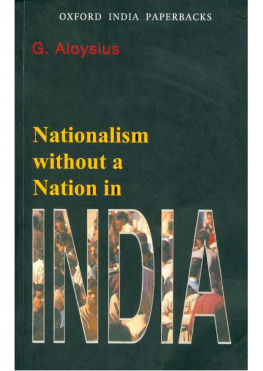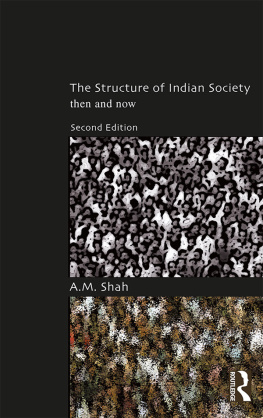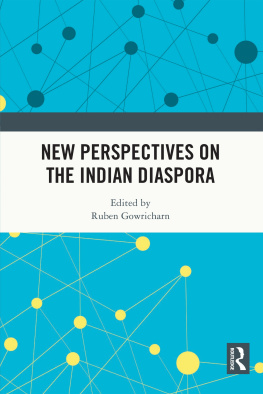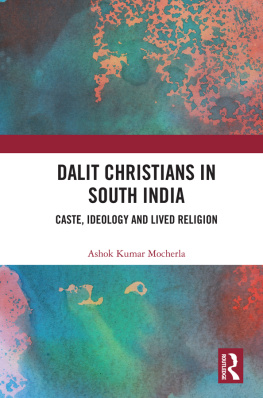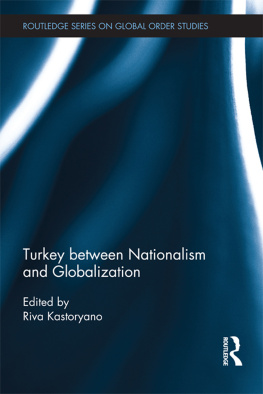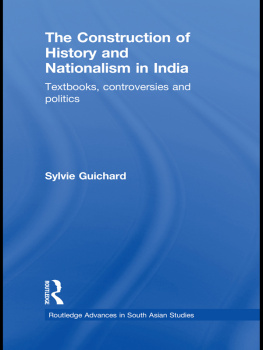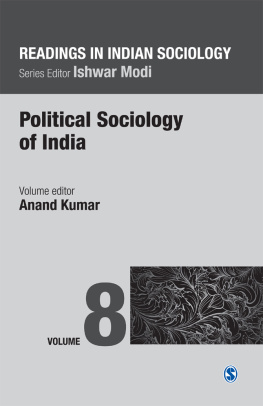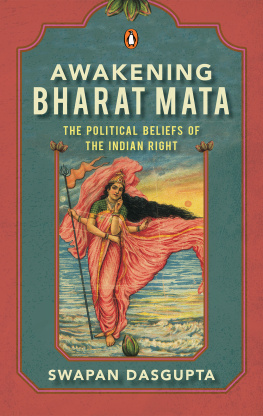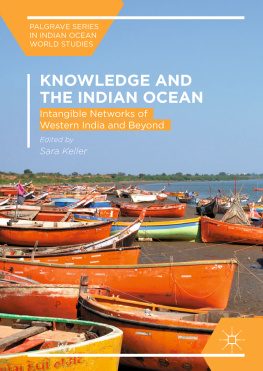G. Aloysius - Nationalism without a Nation in India
Here you can read online G. Aloysius - Nationalism without a Nation in India full text of the book (entire story) in english for free. Download pdf and epub, get meaning, cover and reviews about this ebook. year: 1999, publisher: Oxford University Press, genre: Politics. Description of the work, (preface) as well as reviews are available. Best literature library LitArk.com created for fans of good reading and offers a wide selection of genres:
Romance novel
Science fiction
Adventure
Detective
Science
History
Home and family
Prose
Art
Politics
Computer
Non-fiction
Religion
Business
Children
Humor
Choose a favorite category and find really read worthwhile books. Enjoy immersion in the world of imagination, feel the emotions of the characters or learn something new for yourself, make an fascinating discovery.
- Book:Nationalism without a Nation in India
- Author:
- Publisher:Oxford University Press
- Genre:
- Year:1999
- Rating:3 / 5
- Favourites:Add to favourites
- Your mark:
- 60
- 1
- 2
- 3
- 4
- 5
Nationalism without a Nation in India: summary, description and annotation
We offer to read an annotation, description, summary or preface (depends on what the author of the book "Nationalism without a Nation in India" wrote himself). If you haven't found the necessary information about the book — write in the comments, we will try to find it.
Nationalism without a Nation in India — read online for free the complete book (whole text) full work
Below is the text of the book, divided by pages. System saving the place of the last page read, allows you to conveniently read the book "Nationalism without a Nation in India" online for free, without having to search again every time where you left off. Put a bookmark, and you can go to the page where you finished reading at any time.
Font size:
Interval:
Bookmark:
Nationalism
Without A
Nation in India
G. Aloysius
OXFORD
UNIVERSITY PRESS
OXFORD
UNIVERSITY PRESS
Oxford University Press is a department of the University of Oxford.
It furthers the Universitys objective of excellence in research, scholarship,
and education by publishing worldwide. Oxford is a registered trademark of
Oxford University Press in the UK and in certain other countries
Published in India by
Oxford University Press
YMCA Library Building, 1 Jai Singh Road. New Delhi 110 001, India
Oxford University Press 1997
The moral rights of the author have been asserted
First Edition published in 1997
Oxford India Paperbacks 1998
All rights reserved. No part of this publication may be reproduced, stored in
a retrieval system, or transmitted, in any form or by any means, without the
prior permission in writing of Oxford University Press, or as expressly permitted
by law, by licence, or under terms agreed with the appropriate reprographics
rights organization. Enquiries concerning reproduction outside the scope of the
above should be sent to the Rights Department, Oxford University Press, at the
address above
You must not circulate this work in any other form
and you must impose this same condition on any acquirer
ISBN-13: 978-0-19-564653-5
ISBN-10: 0-19-564653-3
Typeset in Bembo 10/12
by DSM Soft (p) Ltd, Chennai
Printed in India by Replika Press Pvt. Ltd
To the memory of my Father
Preface and Acknowledgements
The study of nationalismideologv, organization, movement etc. in India, has long been the exclusive preserve of the historians. In its external dimension, the discussion ranged between sheer xenophobia, on the one hand and sacred patriotism, on the other. Internally, it hinged around the axis of Hindu-Muslim harmony or disharmony. Sociologists however, have been pre-occupied with movements of all other kinds, considered mainly as instances of status or social mobility, Sanskritization, Westernization or protests' transformations. Though these movements, the 'national' as well as the 'social' were contemporaneous, contributed to. and together constituted the formation of modern India, the 'totality' itself was not problematized in either, leading to the 'rarefication' and eventually 'reification' of the 'grand national' within history. The 'national' became isolated, insulated, elevated and far removed from the 'social' which was often delegitimized as communal/casteist. Concepts such as nationalism and communalism along with colonialism became self-evident categories endowed with almost magical powers to reveal the mysteries of modern India.
In the course of a changing and changed socio-political situation, these master-concepts lost their usefulness. In fact, their functions became reversed and instead of opening up to social reality, they began to block its understanding. This was realized early enough. The seventies pointed out that ideology was often enough an excuse for 'plain pursuit of power': the eighties discovered that despite the shrill claims of nationalism, the 'nation itself failed to emerge". These dissenting voices from within modern Indian historiography are indeed significant. However, they could not proceed beyond a certain limit due to disciplinary constraints, narrow data-base and
non-problematization of the basic conceptnationalism. This is precisely where sociology of nationalism seeks to step in.
Sociology brings to the study of nationalism two specific perspectives: one, that nationalism is not unlike other social phenomena, occurring repeatedly in different regions, cultures and contexts. Various nationalisms are capable of being classified and analysed systematically and that, it is possible to develop at least, the rudiments of a general theory of nationalism. In other words, it is not necessary to consider every nationalism as a 'unique construction. Instead, each case can be viewed as a particular instance of the general class of nationalism. Two, is contextual, according to which nationalismthe ideology, organization, and movement of a given region or culture is to be studied in the context of the structure and change of that society as a whole. Social structure and social change are the two central themes of sociology providing the framework for investigating different spheres of the corporate life of a society and nationalism is no exception.
Viewed sociologically then, nationalism in India, is likely to appear different from what it does within traditional history. The present study is one such attempt. It needs to be taken for what it is: exploratory in nature and tentative in conclusion. However, the study is an attempt at a departure of a major kind. If the issues that have come up in the course of the study are taken up, contested and carried forward by greater minds, its objective will be fulfilled.
Professor Randolf David of the University of the Philippines introduced me to critical sociology; Professor Dipankar Gupta, of the Centre for the Study of Social Systems, Jawaharlal Nehru University, stimulated my interest in the studs' of nationalism; Dr Avijit Pathak supervised the dissertation out of which the present study grew: Professor C. N. Venugopal was an ever-welcoming resource person. Professor Manoranjan Mohanty of Delhi University examined my work and suggested improvements. Professor Dawa Norbu of Jawaharlal Nehru University read through the manuscript and offered recommendations. Among my colleagues M. Kiran was always there to discuss the numerous issues and assist in documentation. However, none of the persons mentioned, and scores of others with whom I have been interacting in the course of the study are to be held responsible for the views, arguments or formulations articulated in this studs, which are solely mine.
The study was carried out mainly in the library of Jawaharlal Nehru University and Nehru Memorial Library. I am grateful to the staff of both these institutions for their help. I am also thankful to the Daryaganj second-hand booksellers for providing me with several important books at affordable prices.
I also thank Murah and Anoma for typing the manuscript, and Rasna Dhillon for preparing the text for publication.
Finally, the study could not have been completed but for the constant support and accommodation of Josna. To her I owe much more than I can express in words.
G. Aloysius
New Delhi
I
Introduction: Historical Sociology and the Study of Nation and Nationalism in India
Change in the Agenda
Nearly two generations have passed since the tumultuous events surrounding the most important organizing principle of the Indian polity occurred in 1947. Sea changes have taken place during this period within and without the country that warrant a fresh look at what was once an all-consuming passion in public lifenationalism.
The mass enthusiasm generated in the wake of Independence and the subsequent engagement in nation-building activities in the early fifties, seemed to have overcome the fissiparous tendencies visible earlier and gave us the illusion that nationalism had indeed invented the nation. But illusion it proved to be, for as mass euphoria over the British departure receded into collective memory and as the economic front began to stagnate, exacerbating the problems of unemployment, poverty, corruption in public life, tenacious illiteracy, population explosion etc., centrifugal and disruptive forces reoccupied the centre-stage with unprecedented vehemence. Nationalism, instead of giving birth to one national society, seems to have delivered a whole litter of communities divided from one another in terms of language, religion, region or caste.
The response of the centralizing state to this bizarre phenomenon has been predictable. True to its colonial inheritance, it has been arming itself to the teeth, not so much against the external enemy as
Next pageFont size:
Interval:
Bookmark:
Similar books «Nationalism without a Nation in India»
Look at similar books to Nationalism without a Nation in India. We have selected literature similar in name and meaning in the hope of providing readers with more options to find new, interesting, not yet read works.
Discussion, reviews of the book Nationalism without a Nation in India and just readers' own opinions. Leave your comments, write what you think about the work, its meaning or the main characters. Specify what exactly you liked and what you didn't like, and why you think so.

